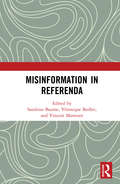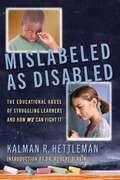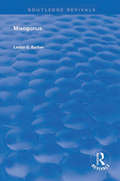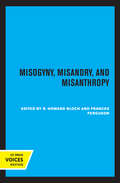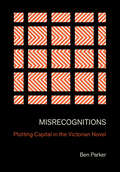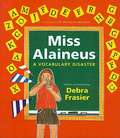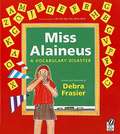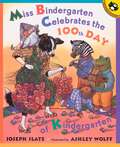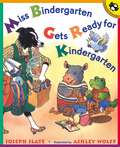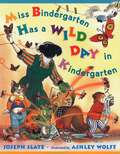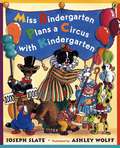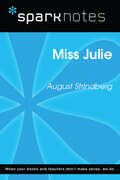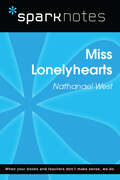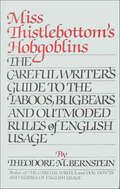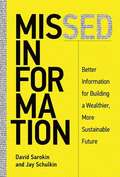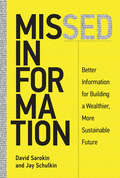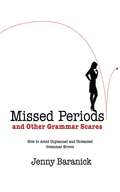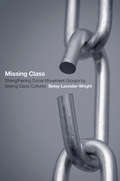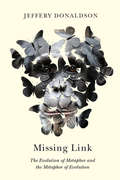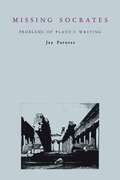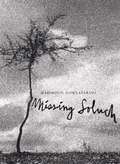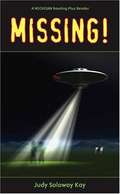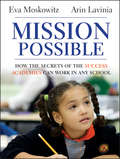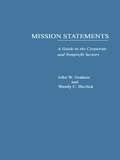- Table View
- List View
Misinformation in Referenda
by Sandrine Baume Véronique Boillet Vincent MartenetThe book identifies the impact of misinformation in the context of referenda. While the notion of misinformation is at the centre of current events and is the subject of several studies, it has rarely been addressed in the context of referenda or from a multidisciplinary and comparative perspective. This book fills this gap. Different legal orders have been chosen because of their extensive referendum practices (California and Switzerland); a recent legislative process on the issue of misinformation (Germany, France, and Canada); or recent experience with a vote during which it was considered that false information had been disseminated (Brexit, Catalan independence, and Italian constitutional referendum of 2016). By bringing together authors from the political and legal sciences, the book focuses on combining the expertise of researchers from different backgrounds and origins in order to propose innovative solutions. In this regard, the book is characterized by the fact that it does not aim to combat misinformation per se, but develops suggestions meant to guarantee the conditions of formation of the political will during referenda. The book will be an invaluable resource for legal scholars, political scientists, and specialists of political communication. Outside the world of academia, the book may draw the attention of policy-makers, practitioners, and journalists confronted with the challenges of misinformation or disinformation.
Mislabeled as Disabled: The Educational Abuse of Struggling Learners and How WE Can Fight It
by Kalman R. HettlemanKalman R. &“Buzzy&” Hettleman exposes the educational abuse suffered by tens of millions of struggling learners, including many who are &“Mislabeled as Disabled&” and dumped into special education. The majority of these students are not disabled in any medical or other clinical sense. Rather, in violation of federal law, they fail to receive proper instruction and fall farther behind, suffering stigma and segregation. Hettleman also shows how teachers are undervalued heroes denied the teaching tools to do the job right and, like students, are victimized by the system. This book is a call to everyone to become enraged, and then engaged in the struggle for reform.
Misogonus: Edited with an Introduction (Routledge Revivals)
by Lester E. BarberOriginally published in 1979, this volume contains the full text of Misogonus, edited and with an introduction and additional textual notes.
Misogyny, Misandry, and Misanthropy (Representations Books #3)
by R. Howard Bloch Frances FergusonThis title is part of UC Press's Voices Revived program, which commemorates University of California Press’s mission to seek out and cultivate the brightest minds and give them voice, reach, and impact. Drawing on a backlist dating to 1893, Voices Revived makes high-quality, peer-reviewed scholarship accessible once again using print-on-demand technology. This title was originally published in 1989.
Misrecognitions: Plotting Capital in the Victorian Novel
by Ben ParkerMisrecognitions mounts a vigorous defense of the labyrinthine plotting of Victorian novels, notorious for their implausible concluding revelations and coincidences. Critics have long decried Victorian recognition scenes—the reunions and retroactive discoveries of identity that too conveniently bring the story to a close—as regrettable contrivances. Ben Parker counters this view by showing how these recognition scenes offer a critique of the social and economic misrecognitions at work in nineteenth-century capitalism. Through a meticulous analysis of novels by Charles Dickens, Anthony Trollope, and Henry James, as well as Arthur Conan Doyle's Sherlock Holmes stories, Misrecognitions tracks how the Victorian novel translates the financialized abstractions of capital into dramas of buried secrets and disguised relations. Drawing on Karl Marx's account of commodity fetishism and reification, Parker contends that, by configuring capital as an enigma to be unveiled, Victorian recognition scenes dramatize the inversions of agency and temporality that are repressed in capitalist production. In plotting capital as an agent of opacity and misdirection, Victorian novels and their characteristic dialectic of illusion and illumination reveal the plot hole in capitalism itself.
Miss Alaineus: A Vocabulary Disaster
by Debra FrasierSage has misheard and misunderstood one of Mrs. Page's weekly vocabulary words. Her error leads to a humbling catastrophe: "a momentous tragedy," in front of the entire class. Can Sage turn her vocabulary disaster: "an event bringing great misfortune," into a triumph: "a true success?"
Miss Alaineus: A Vocabulary Disaster (Into Reading, Trade Book #6)
by Debra FrasierNIMAC-sourced textbook <p><p> Sage has misheard and misunderstood one of Mrs. Page's weekly vocabulary words. Her error leads to a humbling catastrophe: a momentous tragedy, in front of the entire class. Can Sage turn her vocabulary disaster: an event bringing great misfortune, into a triumph: a true success? Anyone who has ever been daunted: discouraged or disheartened, by a mere word in the dictionary will cheer wildly: in a manner lacking all restraint, as Sage transforms embarrassment into victory in Debra Frasier's touching story of loving--and mistaking--our glorious language.
Miss Bindergarten Celebrates the 100th Day of Kindergarten
by Joseph SlateMiss Bindergarten, the world's best kindergarten teacher, is getting ready for another milestone. Tomorrow she and her class will have been together for 100 days. To celebrate, each student must bring "100 of some wonderful, one-hundred-full thing!" At night, while the students go to work assembling their projects, Miss Bindergarten is working, too, making special surprises for the class. The 100th day of kindergarten is bound to be unforgettable! Children will delight in hearing about this special event, a common cause for celebration in kindergartens today.Illustrated by Ashley Wolff.
Miss Bindergarten Gets Ready for Kindergarten
by Joseph SlateThis rhyming, brightly illustrated book is the perfect way to practice the alphabet and to introduce young children to kindergarten.It's the first day of kindergarten and Miss Bindergarten is hard at work getting the classroom ready for her twenty-six new students. Meanwhile, Adam Krupp wakes up, Brenda Heath brushes her teeth, and Christopher Beaker finds his sneaker. Miss Bindergarten puts the finishing touches on the room just in time, and the students arrive. Now the fun can begin! "Multifaceted and appealing, this book can be enjoyed in many ways, at home and at school." --The New York Times Book ReviewFor readers of Kindergarten, Here I Come and The Night Before Kindergarten.
Miss Bindergarten Has a Wild Day In Kindergarten (Miss Bindergarten Bks.)
by Joseph SlateThings are always a little rowdy in a class of twenty-six kindergartners, but there are some days when chaos reigns. Watch what happens in Miss Bindergarten's rambunctious class when water overflows, ants are on the loose, and oozy paint smudges. How will Miss Bindergarten and the kindergartners get everything back in order? This is one kindergarten adventure not to be missed!
Miss Bindergarten Plans a Circus With Kindergarten (Miss Bindergarten Bks.)
by Joseph SlateMiss Bindergarten is planning a circus and all of her kindergarteners are in on the fun! Everyone is busy preparing: painting posters, practicing somersaults, and making popcorn balls. When at last the big day arrives, there will be a parade, complete with clowns and stunts, from baton twirling to "high-wire" walking. And for the grand finale, Miss Bindergarten will give the audience a spectacular, show-stopping act!
Miss Julie (SparkNotes Literature Guide Series)
by SparkNotesMiss Julie (SparkNotes Literature Guide) by August Strindberg Making the reading experience fun! Created by Harvard students for students everywhere, SparkNotes is a new breed of study guide: smarter, better, faster.Geared to what today's students need to know, SparkNotes provides:*Chapter-by-chapter analysis *Explanations of key themes, motifs, and symbols *A review quiz and essay topicsLively and accessible, these guides are perfect for late-night studying and writing papers
Miss Lonelyhearts (SparkNotes Literature Guide Series)
by SparkNotesMiss Lonelyhearts (SparkNotes Literature Guide) by Nathanael West Making the reading experience fun! Created by Harvard students for students everywhere, SparkNotes is a new breed of study guide: smarter, better, faster. Geared to what today's students need to know, SparkNotes provides: *Chapter-by-chapter analysis *Explanations of key themes, motifs, and symbols *A review quiz and essay topicsLively and accessible, these guides are perfect for late-night studying and writing papers
Miss Thistlebottom's Hobgoblins: The Careful Writer's Guide to the Taboos, Bugbears and Outmoded Rules of English Usage
by Theodore M. BernsteinOnce you recall that Miss Thistlebottom was your elementary-school teacher who laid down all manner of taboos concerning the use of language, you will have an idea of what this book is about. In no sense permissive or radical, it topples the taboos that lack historical, logical or grammatical basis. It is a refreshing look at our living language, the perfect companion to the author's indispensable work, The Careful Writer.Mr. Bernstein writes four letters to Miss Thistlebottom that divide the book into four sections: "Witchcraft in Words," "Syntax Scarecrows," "Imps of Idioms," and "Spooks of Style." Can there be more than two "alternatives"? You'll find the answer in the Words section. Can something "grow smaller"? Ditto. How about Split Infinitives: is it proper to ever split one? Is "none" invariably singular? Take a look in the Syntax section. Isn't it absurd to say "if worst comes to worst" rather than "if worse comes to worst" or to say "head over heels" rather than "heels over head"? The section on idioms will enlighten you on these "absurdities." And then, is a preposition a proper word to end a sentence with? The section on Style will show you that some authoritarians don't know what they are talking about and don't know what rules are for.The scores and scores of entries in this book are crisp, lightly written and amply provided with illustrative material. They are designed to help anyone who writes anything--the student, the reporter, the copy editor, the professional writer-cast off the inhibitions and prohibitions that lack validity and cramp his writing style.An Appendix includes some rare, out-of-print sources of some of the bogies: William Cullen Bryant's Index Expurgatorius for writers on the old New York Post, James Gordon Bennett's "Don't List" for writers on the old New York Herald and Ambrose Bierce's blacklist Write It Right.
Missed Information: Better Information for Building a Wealthier, More Sustainable Future
by Jay Schulkin David SarokinInformation is power. It drives commerce, protects nations, and forms the backbone of systems that range from health care to high finance. Yet despite the avalanche of data available in today's information age, neither institutions nor individuals get the information they truly need to make well-informed decisions. Faulty information and sub-optimal decision-making create an imbalance of power that is exaggerated as governments and corporations amass enormous databases on each of us. Who has more power: the government, in possession of uncounted terabytes of data (some of it obtained by cybersnooping), or the ordinary citizen, trying to get in touch with a government agency? In Missed Information, David Sarokin and Jay Schulkin explore information -- not information technology, but information itself -- as a central part of our lives and institutions. They show that providing better information and better access to it improves the quality of our decisions and makes for a more vibrant participatory society.Sarokin and Schulkin argue that freely flowing information helps systems run more efficiently and that incomplete information does just the opposite. It's easier to comparison shop for microwave ovens than for doctors or hospitals because of information gaps that hinder the entire health-care system. Better information about such social ills as child labor and pollution can help consumers support more sustainable products. The authors examine the opacity of corporate annual reports, the impenetrability of government secrets, and emerging techniques of "information foraging." The information imbalance of power can be reconfigured, they argue, with greater and more meaningful transparency from government and corporations.
Missed Information: Better Information for Building a Wealthier, More Sustainable Future
by Jay Schulkin David SarokinHow better information and better access to it improves the quality of our decisions and makes for a more vibrant participatory society. Information is power. It drives commerce, protects nations, and forms the backbone of systems that range from health care to high finance. Yet despite the avalanche of data available in today's information age, neither institutions nor individuals get the information they truly need to make well-informed decisions. Faulty information and sub-optimal decision-making create an imbalance of power that is exaggerated as governments and corporations amass enormous databases on each of us. Who has more power: the government, in possession of uncounted terabytes of data (some of it obtained by cybersnooping), or the ordinary citizen, trying to get in touch with a government agency? In Missed Information, David Sarokin and Jay Schulkin explore information—not information technology, but information itself—as a central part of our lives and institutions. They show that providing better information and better access to it improves the quality of our decisions and makes for a more vibrant participatory society.Sarokin and Schulkin argue that freely flowing information helps systems run more efficiently and that incomplete information does just the opposite. It's easier to comparison shop for microwave ovens than for doctors or hospitals because of information gaps that hinder the entire health-care system. Better information about such social ills as child labor and pollution can help consumers support more sustainable products. The authors examine the opacity of corporate annual reports, the impenetrability of government secrets, and emerging techniques of “information foraging.” The information imbalance of power can be reconfigured, they argue, with greater and more meaningful transparency from government and corporations.
Missed Periods and Other Grammar Scares
by Jenny BaranickGrammar has finally let its hair down! Unlike uptight grammar books that overwhelm us with every single grammar rule, Missed Periods and Other Grammar Scares is like a bikini: it's fun, flirty, and covers only the most important bits. Its lessons, which are 100 percent free of complicated grammar jargon, have been carefully selected to include today's most common, noticeable errors--the ones that confuse our readers or make them wonder if we are, in fact, smarter than a fifth grader. What is the proper use of an apostrophe? When should an ellipsis be used instead of an em dash? Why do we capitalize President Obama but not "the president"? And why is that question mark placed outside of the end quote? Author Jenny Baranick is an English professor whose students can't believe she's actually that into grammar. Upon experiencing the joys of grammar at an early age, raising grammar awareness became Jenny's raison d'être. By spreading her remarkably user-friendly and hilarious approach to grammar, she hopes everyone will experience the satisfaction of a properly placed comma, a precisely used semicolon, and a correctly deployed en dash.Missed Periods and Other Grammar Scares shows grammar as it's never been seen before: uncomplicated, laugh-out-loud funny, and, dare we say, a little risqué.
Missing Class
by Betsy Leondar-WrightMany activists worry about the same few problems in their groups: low turnout, inactive members, conflicting views on racism, overtalking, and offensive violations of group norms. But in searching for solutions to these predictable and intractable troubles, progressive social movement groups overlook class culture differences. In Missing Class, Betsy Leondar-Wright uses a class-focused lens to show that members with different class life experiences tend to approach these problems differently. This perspective enables readers to envision new solutions that draw on the strengths of all class cultures to form the basis of stronger cross-class and multiracial movements. The first comprehensive empirical study of US activist class cultures, Missing Class looks at class dynamics in 25 groups that span the gamut of social movement organizations in the United States today, including the labor movement, grassroots community organizing, and groups working on global causes in the anarchist and progressive traditions. Leondar-Wright applies Pierre Bourdieu's theories of cultural capital and habitus to four class trajectories: lifelong working-class and poor; lifelong professional middle class; voluntarily downwardly mobile; and upwardly mobile. Compellingly written for both activists and social scientists, this book describes class differences in paths to activism, attitudes toward leadership, methods of conflict resolution, ways of using language, diversity practices, use of humor, methods of recruiting, and group process preferences. Too often, we miss class. Missing Class makes a persuasive case that seeing class culture differences could enable activists to strengthen their own groups and build more durable cross-class alliances for social justice.
Missing Link
by Jeffery DonaldsonWe look for missing links in the sciences and humanities, but the essential missing link - metaphor - is always in front of us. In Missing Link, Jeffery Donaldson unites literary criticism and evolutionary and cognitive science to show how metaphor has been with us since the beginning of time as a seed in the nature of things. With examples from centuries of poets, critics, philosophers, and scientists, he details how metaphor is a chemistry, an exchange of energies forming and dissolving, and an openness in the spaces between things. He considers the ways in which DNA learns how to liken things that have been, how mutation makes errors and then tries them on, and how evolution is hypothesis - nature's way of "thinking more." The mind is a matrix of relations: neural synapses cascade into ever-changing pathways and patterns. Metaphor is the substance of things hoped for, the evidence of things not seen. It is the unbroken thread between matter and spirit. Whether offering analysis of a turn of phrase or chemical reaction, Missing Link presents a vision of literature that is also a vision of the cosmos, and vice versa. It enters the debate between evolution and religion, and challenges scientists, literary theorists, and religious advocates to rethink the relations between their disciplines.
Missing Link: The Evolution of Metaphor and the Metaphor of Evolution
by Jeffery DonaldsonWe look for missing links in the sciences and humanities, but the essential missing link - metaphor - is always in front of us. In Missing Link, Jeffery Donaldson unites literary criticism and evolutionary and cognitive science to show how metaphor has been with us since the beginning of time as a seed in the nature of things. With examples from centuries of poets, critics, philosophers, and scientists, he details how metaphor is a chemistry, an exchange of energies forming and dissolving, and an openness in the spaces between things. He considers the ways in which DNA learns how to liken things that have been, how mutation makes errors and then tries them on, and how evolution is hypothesis - nature's way of "thinking more." The mind is a matrix of relations: neural synapses cascade into ever-changing pathways and patterns. Metaphor is the substance of things hoped for, the evidence of things not seen. It is the unbroken thread between matter and spirit. Whether offering analysis of a turn of phrase or chemical reaction, Missing Link presents a vision of literature that is also a vision of the cosmos, and vice versa. It enters the debate between evolution and religion, and challenges scientists, literary theorists, and religious advocates to rethink the relations between their disciplines.
Missing Socrates: Problems of Plato's Writing (G - Reference, Information and Interdisciplinary Subjects)
by Jay FarnessPlato's conversations of Socrates are among the most accessible philosophical texts most of us have ever read, yet the more one pursues the art or intelligibility of this writing, the more mysterious and paradoxical the Platonic texts become. What does it mean to study Plato, not philosophically as a maker of arguments, not poetically as a maker of dialogues, but literally as a maker of texts? This is a question that Jacques Derrida has made his own, and in this book Farness creates a dialogue with Derrida on Plato's texts.Missing Socrates also provides a dialogue between Plato and Socrates on the question of speech versus writing and a study of the materiality of Plato's writing. Included among the various dialogues and themes developed here are rhetoric and courtroom practice in the Apology of Socrates; religion, skepticism, and the idea of transcendence in the Euthyphro; artistic practice and tradition in the Ion; education and political discipline in the Charmides; and rhetoric, writing, commemoration, and the motives of authorship in Phaedrus. In each of these discursive settings, Socrates unsuccessfully seeks a place or a mode for philosophy; Farness shows that the dialogues of Plato uncannily supply that lack.
Missing Soluch: A Novel
by Mahmoud DowlatabadiPerhaps the most important work in modern Iranian literature, this starkly beautiful novel examines the trials of an impoverished woman and her children living in a remote village in Iran, after the unexplained disappearance of her husband, Soluch. Lyrical yet unsparing, the novel examines her life as she contends with the political corruption, authoritarianism, and poverty of the village. It follows her vacillations between love for Soluch and anger at his absence, and her struggle to raise her children without their father. The novel critically evokes the unfulfilled aspirations of modern Iran -- portraying a society caught between a past and a future that seems equally weighted down by injustice. This landmark novel -- poineering the use of the everyday language of the Iranian people --revolutionized Persian literature in its beautiful and daring portrayal of the life of a marginal woman and her struggle to survive. Missing Souluch is published with the support of the Association of American Publishers' Freedom-to-Publish Committee, assisting in the publication of voices censored by the U. S. State Department's ban on books from the "Axis of Evil. "
Missing!
by Judith KayWhen high school students in the small midwestern town of Oakton start disappearing, police are left without any clues until a psychic named Serena Sills begins working on the case. Serena and Police Chief Matt Williams combine detective work and supernatural intuition as they try to find the missing teenagers before it's too late. The MICHIGAN Reading Plus Readers are original fiction written for students who wish to improve their reading skills. The MICHIGAN Reading Plus Readers support the need for extensive reading on topics of interest to today's students. The Readers offer students books in the genres of mystery, science-fiction, and romance. Activities that practice vocabulary and reading skills are provided on the companion website.
Mission Possible: How the Secrets of the Success Academies Can Work in Any School
by Eva Moskowitz Arin LaviniaStrategies for making the schools we need that work for all kidsEva Moskowitz (the founder and CEO of the Success Charter Network in Harlem) and Arin Lavinia offer practical, classroom-tested ideas for dramatically improving teaching and learning. Moskowitz and Lavinia reveal how a charter school in the middle of Harlem, enrolling neighborhood children selected at random, emerged as one of the top schools in New York City and State within three years. The results of the Harlem school were on a par with public schools for gifted students and elite private schools.Describes what can be accomplished when students and adults all work to focus on constant learning and performance improvement; DVD clips can be accessed using a special link included in the book.The Success Academies have been featured in two popular and widely distributed documentaries, Waiting for Superman and The LotteryDetails the Success Academies' THINK Literacy curriculum, which produces dramatic results in student's reading and writing skillsIn addition to providing strategies and lessons for school leaders and teachers, Secrets of the Success Academies also serves as a guide for parents, policymakers, and practitioners who are passionate about closing the academic achievement gap.
Mission Statements: A Guide To The Corporate And Nonprofit Sectors
by John W. Graham Wendy C. HavlickFirst published in 1994. Routledge is an imprint of Taylor & Francis, an informa company.
